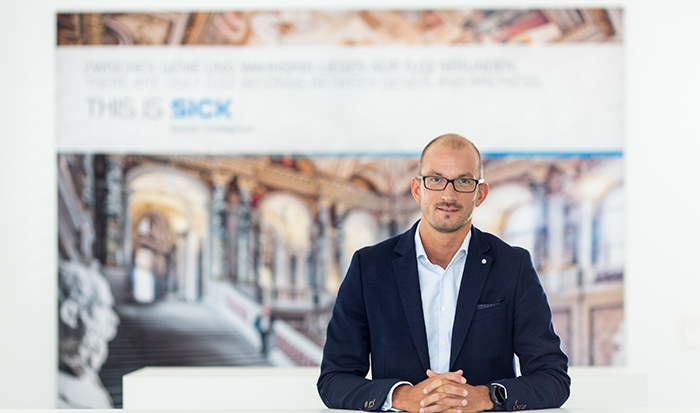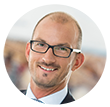Rene Pfaller is Team Leader Product Management at SICK in Wiener Neudorf and is convinced that digitalization must be carried out by the management, otherwise the path to digital transformation will not work.
Rene Pfaller from SICK advises to turn digital hype into a digital must
IoT4Industry & Business: The motto "Digital Business + Smart Data Solutions" is the focus at SICK. What exactly does this mean or what is offered to customers?
Rene Pfaller: The expansion of our digital business models is a very important step for our company to continue to successfully pursue our path to date. In addition to our series product business, there has been a great focus for many years on expanding our service products and systems business in order to continue to be able to meet our customers' needs as best we can in the future.
IoT: That means?
Rene Pfaller: That we have been offering digital products such as analytics solutions that consist of monitoring, diagnostics and predictive maintenance for several years. In addition to the classic purchase of products, we already offer individual digital services based on monthly subscriptions and are generally also open to “pay per use” approaches. On our website we already offer a generator for PLC function blocks for IO-Link sensors independent of the fieldbus, IO-Link master, control or sensor manufacturer, customers can have their desired function blocks created. One of our highlights is definitely the new FieldEcho software tool. With this, IO-Link devices can be configured for the first time with a single software regardless of the manufacturer. A corresponding monitoring function including event log and notifications is also available. The software can be tested free of charge for four ports on a master.
IoT: When we talk about “digital business transformation” we mean the long-term change due to the possibilities and potential of digital offers. Companies can thus adapt their strategy, structure, culture and orientation and further optimize or even change them - all for the future. Isn't it more of a “hype” for companies or is it a “must”?
Rene Pfaller: Of course, “digital business transformation” is an extremely hyped topic that we encounter every day. Nevertheless, it is an indispensable "must" for almost every company if you want to assert yourself in the business world of tomorrow. There is an incredible amount of potential for added value in the data. Studies show that customer loyalty, for example, is enormously influenced by customer experience. It is important to find out what that means in detail for the individual company. More than one in ten companies already employs a data scientist to develop these and other findings and to use them profitably. According to current studies, poorly prepared data cost US companies three trillion euros a year.
IoT: But how far are your customers on the path to digital business and where are the biggest challenges?
Rene Pfaller: We are seeing a significant increase in interest, which we can also confirm from the increasing number of participants at our specialist events. However, you have to be aware that digitization is an issue that has to be borne by the management.
IoT: why?
Rene Pfaller: It is about strategic, future-oriented decisions that will eventually become existential dimensions for the company. If you observe the ever shorter development cycles in technical and economic terms, it quickly becomes clear that, in your own interest, you should not waste any time to actively deal with the topics. At the moment there is probably no worse management decision than to wait and see.
IoT: what would be a motivation?
Rene Pfaller: The path to innovative solutions is shorter than many think and has to be tackled in smaller stages anyway. There is enough potential that can be tapped with manageable financial and human resources. We come to the topic of network expansion, a topic that is directly linked to the advancing digitalization.
IoT: How do you see this challenge for Austria and its network providers?
Rene Pfaller: Of course, a correspondingly high-performance and nationwide network infrastructure is absolutely necessary. From today's point of view, however, I am of the opinion that in Austria we currently suffer only to a limited extent from a weak infrastructure and that this currently only leads to a few points.
IoT: Furthermore, the shortage of skilled workers and digitalization are increasingly being linked. Missing staff should be compensated for by digital options. Right?
Rene Pfaller: A question that probably cannot be answered with a clear “yes” or “no”. From my point of view, the answer for automation technicians is rather no, but from an IT point of view, yes. It is important for the automation engineers to first establish the connectivity. Even if automation engineers are not in abundance, the domestic companies with the existing specialists could already be significantly further than they are today. However, you are definitely looking in vain for good IT specialists in some places, which will certainly hinder progress if you have already implemented the connectivity.
IoT: Another challenge for smart solutions is the associated (increasing) electricity demand. In your opinion, is there a suitable solution for producing this appropriately or using it smart?
Rene Pfaller: Of course, there are also an unbelievable number of hidden ecological and economic opportunities here. Operating large energy consumers when electricity prices and network utilization are cheap or when your own green electricity source allows it is nothing new and is now increasingly being used in the private sector (keyword night electricity). I think we are only at the beginning and analyzes of additional data will show us a lot more optimization potential.
IoT: But how does SICK as a company see this connection between increasing energy consumption and an increasingly desired digitalization? Is this dealt with appropriately in SICK product solutions and taken into account?
Rene Pfaller: Sustainability and ecological thinking have been an important part of our corporate mission statement at SICK for many years - and for us that is not just a marketing slogan. At our Austrian location in Wiener Neudorf, we operate a photovoltaic system with over 80,000 kWh / year of grid feed-in and avoid CO2 emissions of around 50,000 kg / year, which certifies us as a climate-neutral company. Digitization itself certainly does not conflict with energy consumption and CO2 emissions. On the contrary, smart digitization offers new opportunities to use energy more efficiently.
IoT: We have now spoken about many issues associated with digital transformation. If I as a company would now like to look at a showcase project to see to what extent my company can also go digital with SICK solutions, where are you taking me?
Rene Pfaller: In addition to numerous customer solutions, we are showing with our own 4.0 Now Factory Freiburg that Industry 4.0 is already possible here and now with sensor technology. Instead of in rigid lines, the production of light barriers, light sensors and contrast sensors of the latest generation is organized as a decentralized production network: twelve autonomous assembly modules and four manual modules allow the fully automatic, manual or hybrid execution of processes. The modules are digitally networked with each other and organize themselves. All product families go through the modules necessary for the production of the respective variants in the optimal order. The material is supplied via Automated Guided Carts (AGC), which drive independently through the aisles and work with the employees in a collaborative working environment. All processes are controlled by high-performance software that SICK developed itself. This includes information such as product properties, number of pieces or manufacturing steps for the respective order. All 4.0 Now Factory data is collected in real time in the cloud. This creates a virtual image of the production. The most important key performance indicators are visualized in the form of a cloud-based dashboard for the plant manager. This gives them maximum transparency about the current performance of production and all logistics processes. But also by a personal visit to us in Wiener Neudorf or an appointment at the customer facility, interested parties can convince themselves of our solutions.
IoT: to what extent?
Rene Pfaller: In a setup implemented for demo and training purposes, we show digitization from the sensor to the cloud and vice versa. In our office, for example, all employees are informed when our mobile baker arrives at the parking lot in front of the company building. RFID, ultrasonic sensor and edge gateway make it possible and send an email to all colleagues in the house so that nobody has to go hungry (laughs). In addition, we already generate various statistics with the sensor data and analyze the sensor data for predictive maintenance.
The interview was conducted by Stephanie Englert, editor-in-chief IoT4industry & business and was originally published in the IoT issue 1/2020.
Rene Pfaller
Head of Product Management
Rene Pfaller has been with SICK since 2011. He is responsible for the product management at SICK Austria and together with his team, he has various responsibilities from developing to introducing new products, systems and services for our customers. Additionally he is an expert in Industry 4.0 and IIoT topics.
Do you have any questions or would you like a personal consultation?


